
Imago
World Aquatics Championships 2025 – Day 24 – Singapore Team USA during the World Aquatics Championships Swimming competition on Saturday at the Singapore Sports Hub, Singapore on August 3, 2025. Photo by Antoine Lapeyre/ABACAPRESS.COM Singapore Singapore PUBLICATIONxNOTxINxFRAxUK Copyright: xLapeyrexAntoine/ABACAx

Imago
World Aquatics Championships 2025 – Day 24 – Singapore Team USA during the World Aquatics Championships Swimming competition on Saturday at the Singapore Sports Hub, Singapore on August 3, 2025. Photo by Antoine Lapeyre/ABACAPRESS.COM Singapore Singapore PUBLICATIONxNOTxINxFRAxUK Copyright: xLapeyrexAntoine/ABACAx
For twelve long months, USA Swimming operated without a steady hand at the wheel. Since Tim Hinchey’s resignation in August 2024, the federation has cycled through three interim leaders, endured a failed nine-day appointment, and watched credibility fray as the calendar advanced toward the 2028 Los Angeles Olympics. Each delay in hiring a permanent chief only deepened concerns that one of America’s premier Olympic sports had lost its direction.
Watch What’s Trending Now!
That stretch of disorder came after Hinchey left for a role with the Vancouver Canucks. His deputy, Shana Ferguson, briefly stepped in, only to exit for the LA28 organizing committee. Chrissi Rawak followed but resigned in just over a week when SafeSport raised objections. Ferguson returned temporarily, then stepped away again, leaving longtime board member Bob Vincent to keep the office functioning. Vincent described his tenure plainly. “Because I’m a volunteer. That’s what volunteers do. They volunteer. I stepped up to do it, and I’m so glad that I did.”
But now, the vacancy has been filled. Kevin Ring, the former President of Legends Golf, becomes USA Swimming’s new chief executive. His arrival signals the end of a prolonged search and the beginning of a new chapter. Ring addressed the membership directly in the federation’s announcement.
ADVERTISEMENT
“Swimming is one of the world’s most inspiring and global sports, and I am honored to join USA Swimming at such an important moment. There is an extraordinary opportunity to grow participation, connect with new fans and develop innovative partnerships that will fuel success for the entire swimming community. I look forward to working with our athletes, coaches, volunteers, and partners to expand the reach and impact of this incredible sport.”
Ring’s résumé is rooted outside of aquatics. He spent three years leading the golf division at Legends, a company that partnered with the PGA of America to advance sponsorship and data initiatives. Before that, he served as Chief Revenue Officer and earlier as Chief Marketing Officer at the PGA of America, managing partnerships, ticket sales, and merchandising. His background also includes senior roles at IMG Consulting, where he advised on golf, Major League Baseball, Formula One, tennis, and the 2002 World Cup.
While he lacks direct swimming experience, USA Swimming has emphasized his record of building revenue and broadening participation as the skills most needed at this stage. And this appointment comes with strong endorsements.
ADVERTISEMENT
Kevin Ring, a former Executive at PGA of America and President of Golf at Legends, has been hired as the new CEO of USA Swimming. https://t.co/NzEY5TBBR6 pic.twitter.com/5UjJPZy5za
— Swim Updates (@swimupdates) September 4, 2025
Natalie Coughlin, the twelve-time Olympic medalist who will assume the chair of USA Swimming’s Board of Directors, declared, “His commitment to empowering athlete leadership, strengthening coach development, and bringing all stakeholders to the table is exactly what USA Swimming needs to move forward. I’m confident his leadership will make a lasting impact on our sport.” Current board chair Chris Brearton, too, highlighted Ring’s “track record in driving participation and revenue growth” and stressed his ability to adapt practices from other sports to support American athletes in the run-up to Los Angeles 2028.
ADVERTISEMENT
But even as Ring assumes office, the debate over athlete voices continues.
Regan Smith drew attention by liking a comment that stated, “I like that FEMALE American swimmers are speaking out against know it all ex-swimmers that spend all their time on golf courses. A very very well-deserved clap to the USA.” That social media move underscored the cultural tensions within the sport at a time when leadership was in question.
American women did not allow the disapproval from Michael Phelps and Ryan Lochte to dictate the tone of their campaign, choosing instead to deliver with both performance and response. Katie Ledecky acknowledged that the criticism was “frustrating” but explained that outsiders failed to grasp “the magnitude of everything going on behind the scenes.” Gretchen Walsh simply emphasized racing “like I know how,” while Lilly King made her own pointed remark. She tagged both legends as she remarked, “Y’all been real quiet tonight,” when the mixed 4x100m freestyle relay world record was broken by Team USA at the 2025 World Aquatics Championships.
ADVERTISEMENT
Alongside Ring’s arrival, USA Swimming recently appointed Greg Meehan to direct the national team, signaling a broader restructuring after uneven performances at the World Aquatics Championships and the Paris Olympics. With a permanent CEO finally in place, the organization will be judged on whether it can turn governance stability into a competitive resurgence. Yet, alongside this, Michael Phelps and Rowdy Gaines sharply criticized USA Swimming’s leadership, warning that structural failures threatened the sport’s future.
Michael Phelps and Rowdy Gaines call out the USA Swimming leadership crisis
Michael Phelps did not mince words when he declared that his frustration was aimed at the leadership of USA Swimming, not the athletes themselves. His statement, “No one really wants to talk about how broken USA Swimming has become,” carried a weight that demanded attention. The 28-time Olympic medalist pressed for accountability and transparency, arguing that the organization’s direction was being compromised by a lack of effective leadership. His choice of words gave the impression of both disillusionment and urgency, a rare glimpse into the concerns of a figure whose voice has long defined the sport.
ADVERTISEMENT

Imago
July 21, 2018 – Chicago, Illinois, U.S – MICHAEL PHELPS during the Special Olympics 50th Anniversary Concert at Huntington Bank Pavilion at Northerly Island in Chicago, Illinois Chicago U.S. PUBLICATIONxINxGERxSUIxAUTxONLY – ZUMAs135 20180721_zap_s135_071 Copyright: xDanielxDeSloverx
Then, Rowdy Gaines, a Hall of Fame swimmer and one of the most recognizable voices in American swimming, made it clear that he shared Phelps’s concerns. He supported Phelps unequivocally, reminding the public that when an athlete of his stature speaks, “people had to listen.”
“A strong medal haul doesn’t mean there aren’t serious structural issues underneath. If we only measure success by what shows up on a scoreboard, we risk missing the warning signs that could cost us in the years ahead.” His words underscored a warning that victories in the pool should not obscure failings in governance.
ADVERTISEMENT
That disagreement between champions and administrators reached a moment of tension after Team USA broke the world record in the mixed 4x100m freestyle relay. Lilly King’s social media post aimed at Phelps and Ryan Lochte prompted Phelps to reply in a manner that sounded more weary than contrite.
Top Stories
PGA Tour Pro Loses His Cool After Being Denied Entry Into WM Phoenix Open Field

Giannis Antetokounmpo All but Confirms Warriors Trade With 6-Figure Decision: NBA Rumor

Brooks Koepka’s Unscathed Return Upsets Viktor Hovland as PGA Tour Pro Refuses to Hold Back

U.S. Senator Announces Bad News For NFL Fans After Donald Trump’s Ruling on ESPN’s Billion-Dollar Takeover

Josh Allen’s Former Coach Breaks Silence on Buffalo Exit as Joe Brady Assembles Bills’ Staff

Mike McCarthy Receives Bad News as Aaron Rodgers’ Return to Steelers Faces Major Setback

“Apologies for having higher expectations for the leadership of the team. My opinions were way off.” The remark resembled resignation more than reconciliation, reinforcing his earlier concerns about leadership rather than erasing them.
For both Phelps and Gaines, the conversation extended beyond illness, medals, or single meets. Their criticism was directed at the structural health of USA Swimming, a reminder that excellence in competition cannot compensate for deficiencies at the organizational level.
ADVERTISEMENT
ADVERTISEMENT
ADVERTISEMENT
ADVERTISEMENT